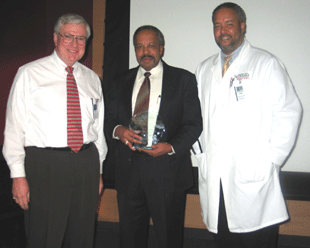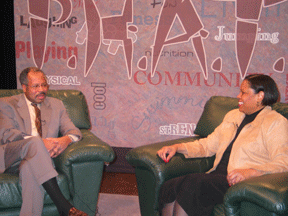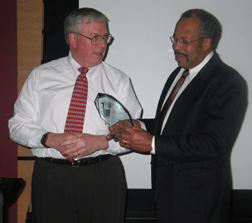 |
Gordon Todd, Ph.D., left, Latta Committee chair and associate professor, UNMC department of genetics, cell biology and anatomy, presented a commemorative crystal plaque to Dr. Wright, center. Also shown is Rubens Pamies, M.D., vice chancellor for Academic Affairs and dean of Graduate Studies. |
Dr. Wright was on campus two days last week as guest presenter for the 22nd John S. Latta Lectureship, sponsored by the UNMC College of Medicine Alumni Association, and the UNMC’s cardiovascular research symposium. A renowned investigator in clinical pharmacology, Dr. Wright is internationally known for his research on antihypertensive and cholesterol lowering agents and, in particular, how these agents affect minority patients.
Helping the black community
“I never intended to be a physician originally,” said Dr. Wright, program director of the Case Western Reserve University General Clinical Research Center and director of the Clinical Hypertension Program at CWRU/University Hospitals of Cleveland. “I just always liked science and experiments. I think I blew up my bedroom and the family basement a time or two in my youth, but I had very understanding parents. I really enjoyed chemistry and that is why I pursued my doctorate first.
 |
Dr. Wright answers questions at the Latta lecture, as Rubens Pamies, M.D., vice chancellor for Academic Affairs and dean of Graduate Studies, looks on. The lecture honors the dedicated service of John S. Latta, the former chairman of the department of anatomy. |
Dual focus yields research success
Today, Dr. Wright’s dual focus on biomedical research and patient care makes him a giant in the successful enrollment of minorities for long-term research projects. During his lectures and interactions with faculty and students on campus, he presented details of his research on the most effective drugs to lower blood pressure and manage hypertension in the elderly and in black patients.
Mangaging high blood pressure, diabetes
 |
Dr. Wright and Valda Boyd Ford on the set of “Valda’s Place.” |
“The black community simply has to better manage high blood pressure and diabetes,” Dr. Wright said, while taping a segment of Ford’s cable talk show, Valda’s Place. “Black patients are from four to 20 times more likely to end on dialysis due to kidney failure than a white patient with high blood pressure. Yet, prior to a study we did with 1,100 patients around the country; no research had been done to determine the best treatment to prevent the progression of kidney disease.”
Leading the largest blood pressure study
Another study Dr. Wright led was the largest ever conducted on blood pressure. More than 42,000 patients from the United States, Canada, Puerto Rico and the Virgin Islands were enrolled, including more than 15,000 black people. It was the first ever comparison of blood pressure medications to determine which were the most effective in not only lowering blood pressure but preventing strokes, heart attacks, and kidney disease, as well heart failure in black patients. That study revealed that the simple and inexpensive water pill was a more effective medication than a number of expensive drugs. In fact, Dr. Wright remembered a particular blood pressure medication that was widely prescribed for almost 10 years before it was finally studied and found out to be largely ineffective, until combined with a second drug.
Enrolling minorities for research studies
Dr. Wright’s success in enrolling minorities for research projects is due to many factors – diversity in the research team and close attention to patient understanding of all the details – but the most important aspect of his teams’ successes is simple – respect for the patients. He says he has consistently found that patients put great value on being singled out as “special” and knowing that their physician has an additional interest in their relationship.
 |
Dr. Wright admires a crystal plaque presented by Gordon Todd, Ph.D., Latta Lecture committee chair and asssociate professor in UNMC’s department of genetics, cell biology and anatomy. |
Soul food feeds high blood pressure, diabetes
Yet, Dr. Wright said, the primary reason high blood pressure and diabetes have turned into major killers of African Americans is because of what sits in the middle of the dinner table – traditional soul food. He is disheartened at the depth to which “left over slave food” has become entrenched as “soul food” – the African American natural cuisine. The fact is that the original pre-slavery diet for blacks in Africa was primarily fresh vegetables and fruits, lean meats and fish – all of which was virtually salt free.
“The slave masters fed the slaves all the foods they considered inedible -the pig’s feet, tail, snout, ears, stomach linings, neck bones, ox’s tail, and so on,” Dr. Wright said. “The slaves were never given nutritious food. They were fed just enough calories to keep them alive and working. In order to make these greasy, substandard foods palatable, the slaves had to add massive amounts of salt and whatever other seasonings they could grow themselves.
“The contemporary soul food diet feeds every negative index of high blood pressure and diabetes among African Americans. I beg my patients all the time to remove salt from their diets. They say, ‘But doc, it won’t taste good without salt.’ And I tell them, ‘Good, maybe you’ll eat a lot less of it that way.”